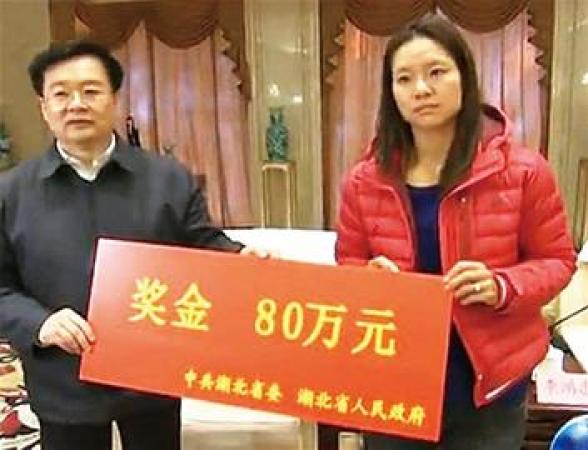Li's cash bonus seems nothing to smile about
 0 Comment(s)
0 Comment(s) Print
Print E-mail Shanghai Daily, January 30, 2014
E-mail Shanghai Daily, January 30, 2014
Chinese tennis star Li Na, winner of the Australian Open championship, seemed to show little interest when the government of the central province of Hubei awarded her 800,000 yuan (US$132,124).
|
|
|
Australian Open champion Li Na was poker-faced when handed a giant red check by governor Wang Guosheng of Hubei Province. [Photo: 163.com] |
The 31-year-old was poker-faced, according to online comments, when handed a giant red check by provincial governor Wang Guosheng after she flew into her hometown of Wuhan on Monday.
There was no trace of a smile, even when her former coach, Yu Liqiao, gave her a hug.
Internet users contrasted photographs of the event with those showing her beaming on an Australian beach holding the tournament trophy.
Some found video clips appearing to show her being slapped on the face at a National Games tournament in 2001 and said that could be the reason for her aloofness.
But Hu Dechun, director of the Hubei Sport Administration, said Li was just exhausted after a long flight, the Beijing Youth Daily reported.
There was also online criticism that the award was an abuse of taxpayers’ money.
“Li Na doesn’t lack money. Why not give it to needy people?” was one comment.
Xinhua news agency described the event as “embarrassing” and “money-worshipping.”
But Hu defended the award. “There are policies and rules behind the award. Any world or national champions will be awarded. The amount is equal to that given to champions at last year’s National Games,” Hu said.
Xiao Huanyu, a Shanghai University of Sport professor, said: “Our sports authorities just value athletes’ achievements. We regard them as machines when training them. How much you will get depends on your achievements.”
Xiao told Xinhua: “The government deems sports achievement a kind of political achievement.
“Therefore it needs to hand out the bonus to ‘show its face’ even though Li Na’s triumph had little to do with the government.”
Li opted out of China’s rigid state sports system in 2008, hiring her own coaches and controlling more of her winnings. Now, she has endorsements worth more than US$40 million.
In her autobiography “Playing Myself,” Li pointed out that authorities never realized that players needed respect rather than money.
“I have played tennis for more than a dozen years, but I never felt I was enjoying it. This was my biggest regret,” Li wrote to describe life before she quit the state-run system.
Li told how she was forced to separate from her partner and husband Jiang Shan when they competed for Hubei at the ninth National Games in 2001.
“We are people, not chess pieces. I partnered Jiang because we have played tennis together for four years and know each other well,” she wrote. Jiang and his new partner won the mixed doubles, while Li’s new partnership came third.
Video clips appeared to show her being slapped in the face by the presenter when she was given her bronze medal.
Jiang’s then partner Li Ting, however, said Li Na was crying in disappointment and the presenter, a tennis official, had just patted her on the face in sympathy, according to China News Service. But Li Ting confirmed that Li Na had a troubled relationship with Yu, her then coach.
“Our coach didn’t know how to praise players. In nine years, she never praised us but often blamed us. Under these conditions, children were very likely to lack confidence,” Li Ting said.
Yu admitted Li Na had complained she didn’t care for her much. But Yu thought the relationship broke down when she didn’t tell her when her father was ill so as not to interrupt her training, according to news portal 163.com.
Li’s father, Li Shengpeng, a former badminton player with the provincial team, died in 1996, the first year that she, then 14, trained in Hubei’s tennis team under Yu.
Li became the first Chinese national to win a tennis Grand Slam when she captured the French Open title in 2011.
The Hubei government gave her a 600,000 yuan bonus after that historic triumph.
She donated the money to a nursing home in the province.







Go to Forum >>0 Comment(s)